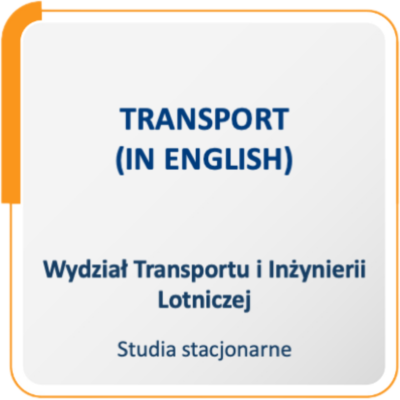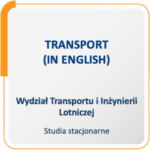- Opis
- Dodatkowe informacje
Opis
Transport (in English)
| Mode of study | Title obtained | Period of study | Language of instruction | Place of classes | Minimum number of credits (Polish students) | Admission limit | Points to guarantee admission |
|---|---|---|---|---|---|---|---|
| Full-time | Bachelor of Science (Inżynier) |
3,5 years / 7 semesters |
English | Katowice | 30 out of 150 max. | 30 | 50 |
Faculty of Transport and Aviation Engineering
Katowice, 8 Krasińskiego St.
phone: 32 603 40 41
e-mail: wt_rekrutacja@polsl.pl
You will learn the rules governing the development of modern transport. You will explore the secrets of engineering means of transport and transport infrastructure, traffic engineering and analysis of transport systems. You will be prepared to think creatively and use advanced knowledge in the field of organization and design of systems, as well as processes and technologies of road, rail and air transport as well as transport logistics. In addition, you will learn legal regulations and economics of transport activities.
Transport is the flywheel of the modern economy. Despite the important role it plays, there are many challenges ahead. Digitization, decarbonisation and further expansion of the road network are the most important development trends in this area of the economy. Education in our field meets broad expectations: we will teach you how to make transport environmentally friendly, less emission-intensive, more sustainable and using new types of energy. Dynamic technological development, automation and the increasingly bold use of artificial intelligence mean that what was innovative yesterday is now widely used. Autonomous cars, computer-controlled cars, intelligent electric and hybrid vehicles, hydrogen-powered city buses are just some examples of a civilizational leap in transport. While studying, you will not only have access to the latest solutions, but you will be able to create or improve them.
During your studies in the field of Transport, you will gain knowledge, skills and competences in the field of:
- basic engineering knowledge and its application in transport,
- construction and operation of conventional and modern means of transport and transport infrastructure,
- solving problems in the field of organization, planning, designing control and traffic management systems,
- selection of materials, production technology and repair technology of means of transport,
- transport and logistics,
- transport activity and its legal and economic aspects,
- special, multimodal, intermodal, oversize transport, for sensitive loads and dangerous goods.
In the 6th semester of studies, each student undergoes an apprenticeship. The internship lasts 4 weeks and corresponds to the selected specialty. In addition, students have the opportunity to participate in didactic trips, study visits and internships, during which they make contact with potential employers (transport companies, airports, vehicle inspection stations, state administration units, traffic management centers, production companies, automotive technical facilities, operator improvement centers means of transport, trade fairs). Such an internship in the industry is the first step towards your career.
Your professional career begins at university. Then you gain knowledge and new competences, among others, through domestic and foreign trips (e.g. ERASMUS+ program), project implementation (e.g. PBL projects) and activity in student science organizationa. As a graduate, you can work, e.g. in positions:
- a pilot, an aircraft mechanic, a car diagnostician, a freight forwarder,
- in design units of means of transport and transport infrastructure,
- in production and operating units of transport,
- in shipping companies and logistics centers.
- in state administration units and services related to transport.
Krystian:
“I recommend the studies for the level of education and the commitment of the staff to teaching and scientific projects. Education in the field of Transport facilitates obtaining interesting and desirable qualifications on the labor market (e.g. car diagnostician, certificate of professional competence).”
Oliwia:
“My choice of study in the field of Transport was caused by the desire to continue this field after technical school. It was a very good decision because I deepened my knowledge in the field of transport and logistics. A large variety of activities allowed to learn all the secrets of transport logistics. Internships, which contributed to gaining additional practical skills, were also a strong point. All the information, skills and competences gained allow me to work perfectly in my dream job in transport logistics.”
Qualification is based on the results of the written parts of the matura exam.
P = 0,5 × Wmp + k × Wadditional
where:
P – number of points in the qualification process,
Wmp – number of points (%) obtained in mathematics (basic level),
Wadditional – number of points (%) obtained in one additional subject (mathematics – advanced level, biology, chemistry, physics, computer science) or the result of vocational exams in a profession taught at the technician level,
k = 0.5 for the basic level,
k = 1 for the advanced level,
k = 0.7 for the result of vocational exams in a profession taught at the technician level.
Points are calculated using the subjects where the candidate scored the highest. If a subject wasn’t taken at a required level, it is counted as 0 points in the final calculation.
Full admission criteria, including those for applicants qualifying on a basis other than the matura exam (nowa matura) and the list of recognized technician-level professions, are available on a separate page.
Dodatkowe informacje
| Tytuł | inżynier |
|---|---|
| Stopien | Stopień I |
| Forma | Stacjonarne |
| Język | Angielski |
| Kierunek | Transport |
| Miasto | Katowice |
| Profil | ogólnoakademicki |
| Rekrutacja | Pokaż |
| Wydział | Wydział Transportu i Inżynierii Lotniczej |
| Elastyczny | Pokaż |





